
The Results
With Greece coming from nowhere in the final stages, it meant that Indonesia was no longer the clear winner – it led to some uncertainty as several of us tried to calculate the winner before the official results were released by the event crew.What made it more uncertain is when Indonesia’s motherboard gave up the ghost with about 15 minutes to go – there wasn’t enough time for the team to rebuild their system on a new motherboard, because it would need modification, insulation and tweaking. The team walked over to the then current leaders in the 3DMark 2001 phase, Coolaler Taiwan, to shake hands and congratulate them on their day’s work.
At one point, it did look like Coolaler Taiwan might steal the win, as the team was increasing its 3DMark score with almost every run – they’d managed to get some crazy clocks out of both CPU and GPU, and combined with the LOD hacks in RivaTuner they were pulling some pretty high scores.
Sadly, their efforts turned out to be not enough because their SuperPI 1M time wasn’t fast enough to really challenge either Greece or Indonesia.
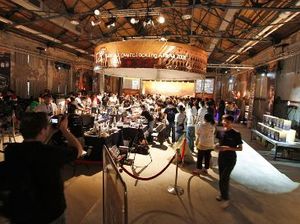
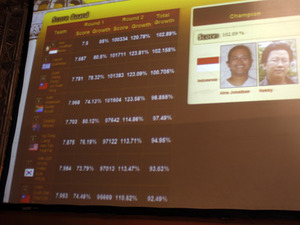
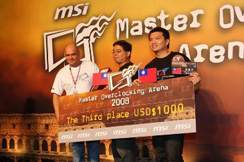
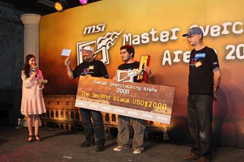
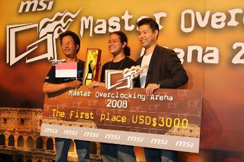
Third - Taiwan Coolaler (left), Second - Greece (centre), First - Indonesia (right). For a full breakdown of the final scoreboard, see the official MOA website Click to enlarge
In the end, the two were separated by less than 0.8 percent in favour of the Indonesian team of Rekky and Alva Jonathan – their SuperPI time was too much of a gap to make up and they’d already posted a reasonably high 3DMark score before their motherboard suffered an unfortunate, but coldbugged death.
This meant that the team walked away with the $3,000 USD top price, while Greece had to settle for the $2,000 USD second prize. Coolaler Taiwan walked away with third, which was for $1,000 USD – all of the winners were also given an MSI X58 Eclipse motherboard too and I'm sure in the future these overclockers will be working closely with MSI to make better products.

Final Thoughts
MSI’s event was incredibly well-organised and the company put on a great show for everyone who attended the inaugural Master Overclocking Arena grand finals. It was strange not to see the Americans involved at this event, because there really are some world-class overclockers in that part of the world – it seemed strange for FUGGER and K|ngp|n not to be present. I’ve been assured that this will change next year and we hope it does if MSI’s event is going to be taken as seriously as I feel it deserves to be.From the time I spent in Taiwan, where I talked to a lot of the overclockers and also several industry insiders—not just from MSI— about these types of events, I think that we’re going to see these overclocking events go from strength to strength over the next couple of years. This year has been very much about testing the water and I wouldn’t be surprised if at some point there is actually a much bigger ‘open’ overclocking world championship in addition to these smaller events run by the motherboard manufacturers.
It’d be great to see the overclockers bring their own kit, have their own sponsors and really go all out to break as many world records as possible. There was no shortage of excitement and tension at the event but it was all in good spirits. The sportsmanship and professionalism shown by all of the teams was a credit to the overclocking community and despite competing against one another, every team seemed to be looking out for each other, loaning multimeters and other equipment where required and it really was great to see teams working together to achieve great things.
I hope that the overclocking competitions that are bound to happen next year are even better than this year’s events and, what’s more, I hope they result in some even better products for the enthusiasts’ community. I’m not just talking about the super-duper high-end motherboards too, I’m hoping that the collaboration with the overclocking community will result in some great affordable motherboards as well.

MSI MPG Velox 100R Chassis Review
October 14 2021 | 15:04








Want to comment? Please log in.